better homes and gardens sheets 700 count
Hide
In this guide
Home Inspection Prices by Size of the House
Home Inspection Cost by Type of House
Home Inspection Price by Type
Specialty Home Inspection Cost by Type
Pest Control Inspection Cost by Pest
Home Inspector Cost
Home Inspection Process
What to Do Before a Home Inspection
What to Do After a Home Inspection
New Construction Home Inspection Cost
Pre-listing Home Inspection Cost
Thermal Imaging Inspection Cost
VA Home Inspection Cost
Home Inspector Certification
How to Hire a Home Inspector
Home Inspection Contingency
Home Inspection vs Appraisal
Common Repairs Following a Home Inspection
4 Point Inspection vs Full Inspection
Enhancement and Improvement Costs
Additional Considerations
FAQs
Home Inspection Prices by Size of the House
Many factors go into the overall price of home inspections, but one you can count on is the size of the home. The house inspection cost is often calculated by the square footage of the home, which determines how much space the inspector needs to look at and how much time will be required for their services. The below table demonstrates how the general home inspection cost increases depending on the size of the house.

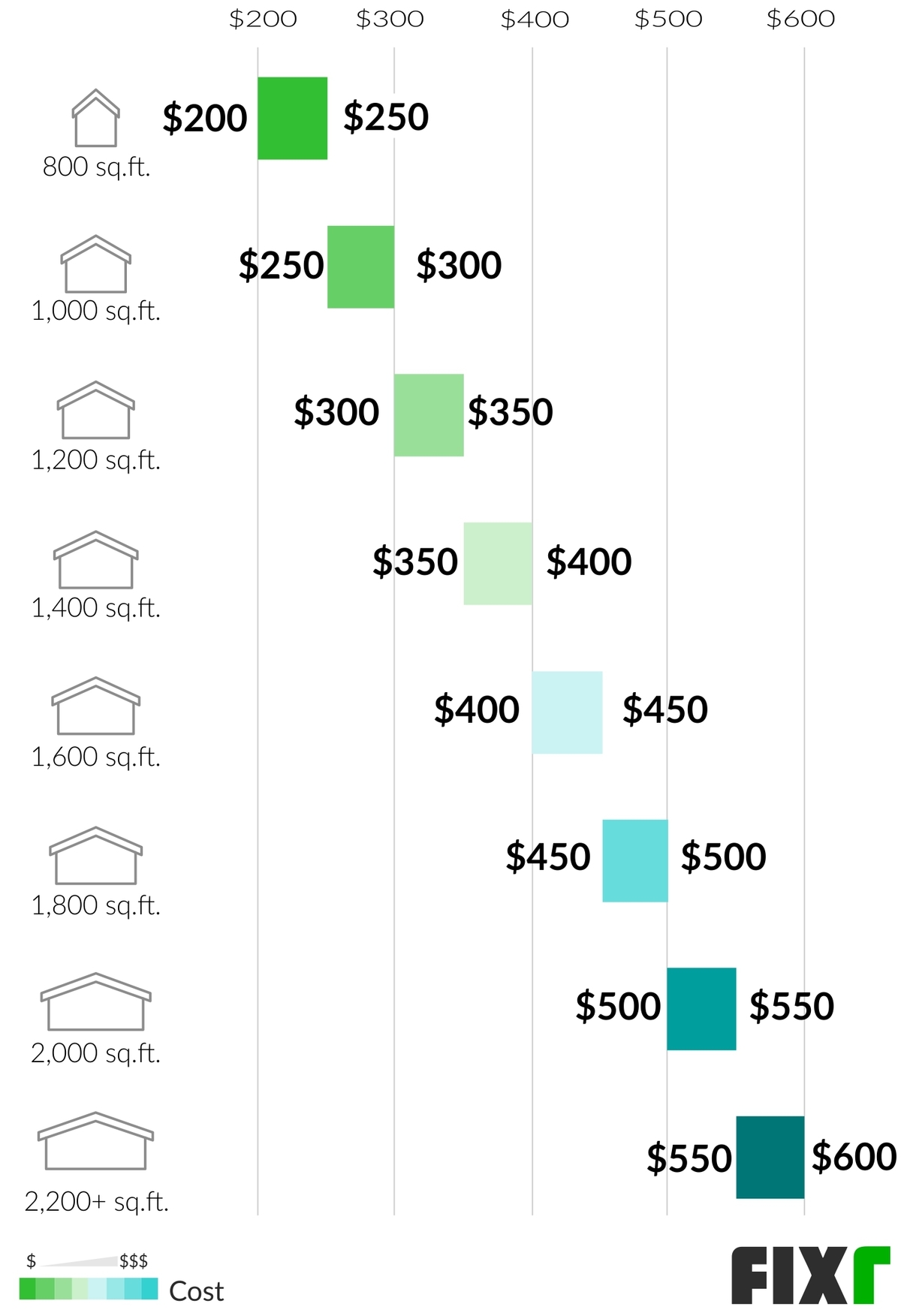
| Size of the House (Square Feet) | Cost |
|---|---|
| 800 sq.ft. | $200-$250 |
| 1,000 sq.ft. | $250-$300 |
| 1,200 sq.ft. | $300-$350 |
| 1,400 sq.ft. | $350-$400 |
| 1,600 sq.ft. | $400-$450 |
| 1,800 sq.ft. | $450-$500 |
| 2,000 sq.ft. | $500-$550 |
| 2,200 sq.ft. | $550-$600 |
Compare prices from home inspectors near you
Home Inspection Cost by Type of House
The average home inspection cost varies based on the type of home. A small condo in the city will cost less to inspect than a sprawling single-family home in a sought-after subdivision. Houses with basements and crawlspaces will be more expensive to inspect because crawlspaces are tight areas and more difficult to reach. A basement or crawlspace means more square footage to cover and more to report on overall. The basement inspection cost varies based on the number of rooms and whether it's a finished or unfinished basement. Here are some of the most common types of homes and the average home inspection cost associated with these building designs.
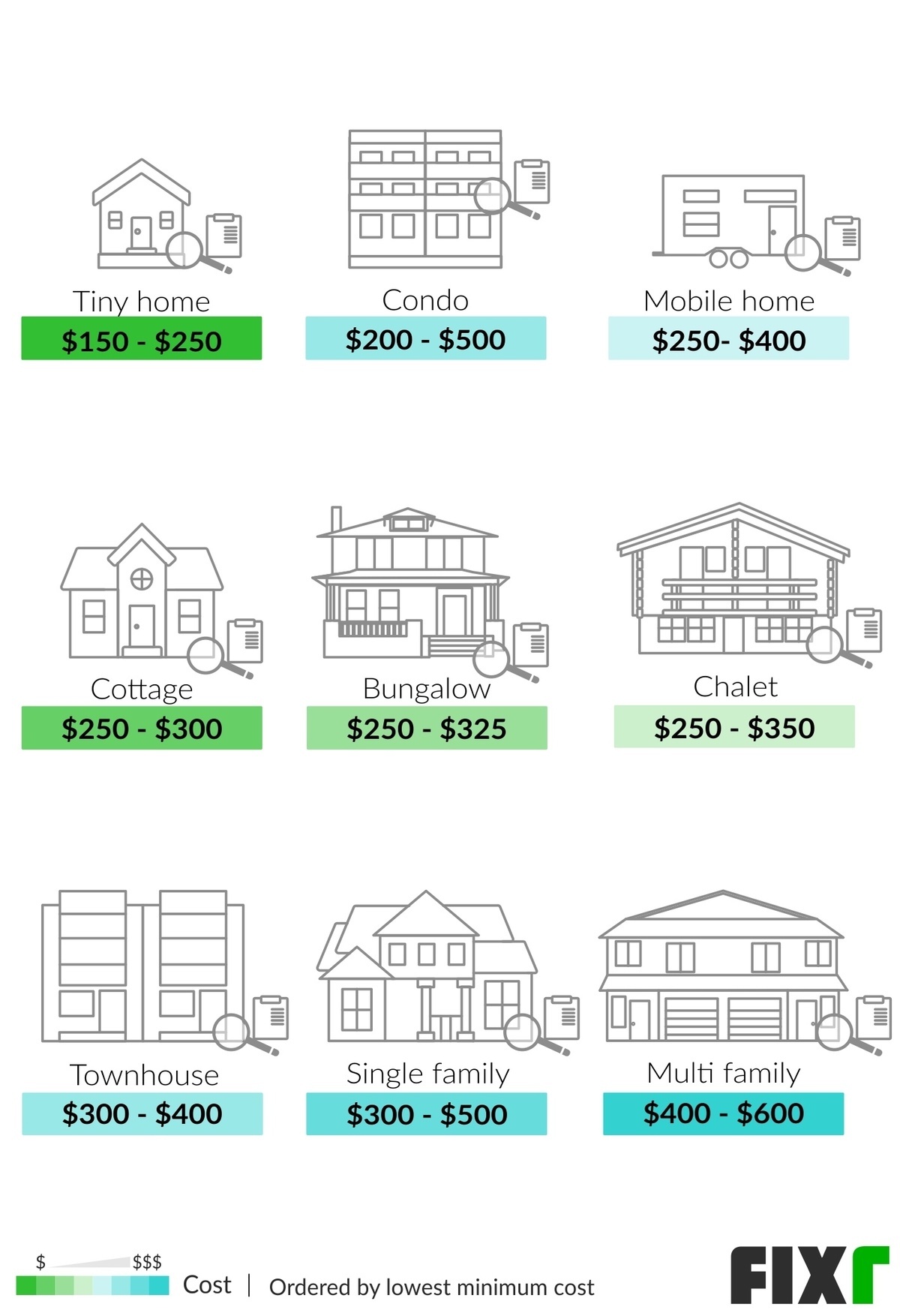

| House Type | Cost |
|---|---|
| Tiny Home | $150-$250 |
| Condo | $200-$500 |
| Mobile Home | $250-$400 |
| Cottage | $250-$300 |
| Bungalow | $250-$325 |
| Chalet | $250-$350 |
| Townhouse | $300-$400 |
| Single Family | $300-$500 |
| Multi Family | $400-$600 |
Tiny Home Inspection
Tiny homes are becoming more popular as people realize the benefits of these miniature houses. These homes can be as small as 80 square feet or up to 400 square feet. Everything is on a smaller scale in these buildings. They often include just one section for sleeping and another for cooking and cleaning up. Little staircases, windows, nooks, and crannies make these homes ideal for those who want to downsize and live a minimalist lifestyle. They are often situated on trailers to be moved around or placed on a spacious lot of land to encourage a life spent in the great outdoors rather than inside.
Considering the small size and minimal components in these structures, the average cost for a tiny home inspection is around $150 to $250. There's simply less to look at in these houses and not much space to move around, so the process is quick. Tiny homes inspection ensures that their quick construction lives up to the quality standards and provides a safe place to live as an alternative form of housing.
Condo Inspection Cost
A condominium building contains individually-owned units, which may be inspected before purchase. A homeowners' association covers the exterior and building-wise maintenance issues and many problems pertaining to the overall construction and building structure. Some buyers choose to forgo condo inspections for that reason. They trust the association to take care of any major issues. Even so, it's best to get a professional condo inspection to ensure all of the electrical, plumbing, and HVAC fittings are intact and floors, walls, and ceilings meet the standard.
Most buyers pay around $200 to $500 for a condo inspection, with the final cost depending on the condo's square footage and age. A one-bedroom condo in a new unit may take less time to inspect than a three-bedroom penthouse in a historic building.
Mobile Home Inspection Cost
Mobile homes are actually more common than people think. More than 21 million people in the US live in mobile homes. It is as important to have a home inspection for a mobile home as it is for a regular home. A mobile home inspection, for the most part, is just like a regular home inspection. Mobile homes do, however, have some unique features that are different and require special examination. Many things are looked at during a mobile home inspection, including electrical wiring, a/c systems, plumbing, roof, switches and faucets, foundation, and so on. The inspection of a mobile home varies from $250-$400 with mobile homes in urban and resort areas on the higher end of the range.
Cottage Inspection
A cottage style house may be less expensive to inspect than a traditional single-family home due to the smaller size. Cottages are small, simplistic homes with a straightforward layout. They are often located in small towns and rural locations, such as lakeside or farming communities. Most cottages have just one or two bedrooms with a bathroom, kitchen, and living space. Others have additional rooms tucked away in a tidy upstairs.
The size of a cottage keeps inspection costs down. Many cottages are older and may have plumbing and electrical systems that need repairs or don't necessarily meet modern standards. That's why the average cost for a cottage house inspection is $250 to $300.
Bungalow Inspection
Bungalows are similar to cottages. The main difference is that a bungalow has a signature low style sloping roof with a broad front porch. As seen in the famous California bungalow style, these homes are usually all one level, or they may have a room in the roof with dormer windows. Bungalows are usually quite small in terms of square footage, which means a more affordable inspection price. However, older bungalows may have more issues with the electrical wiring and HVAC systems.
The home inspector needs to check the entire bungalow, especially if it has historical systems that haven't been upgraded in a long time. Bungalows are often situated close together in neighborhoods or by the beach and are common in humid areas where there may be moisture or mold issues. A full home inspection ensures that the bungalow is still in good condition and usually costs $250 to $325.
Chalet Inspection
Another type of house that may be inspected is a chalet. Typically thought of as a ski lodge or cabin, a chalet is built of wood with a wide, sloping roof and eaves 1 coming out at a right angle from the home. Chalets may be single or double story and have several bedrooms, bathrooms, and living spaces. Chalets are sometimes susceptible to termite infestations and mold growth due to the timbre construction. Homebuyers may opt for a thermal imaging inspection to better detect pests and fungi beneath the floors and walls.
A chalet inspection is usually less than a single-family home inspection due to the slightly smaller size. Plan to pay between $250 and $350 for a standard chalet inspection.
Townhouse Inspection Cost
Townhomes are typically single-family residences in terrace-style housing, where at least two homes are connected side by side. Some townhomes may only have two units, while others are in rows of three, four, five, or even six or more. Like condos, townhomes usually have homeowner associations that manage the outside upkeep, but the inside of the home is the owner's responsibility.
Many townhomes have similar square footage to single-family homes with a smaller yard, which explains why the average cost is very similar, around $300 to $400. Most companies will charge more for a four-bedroom, three-bath townhome than a one bed, one bath, as it all depends on the square footage.
Single Family House Inspection
There are close to one million new single-family homes built in the U.S. every year, thanks to the high demand for these standalone homes. Single-family homes are found in cities, suburban neighborhoods, and rural areas and are detached houses with small, medium, or even large yards depending on the property. Many home inspection companies base their pricing around single-family homes due to the frequency of inspection requests for these properties.
With well over 80 million single-family homes across the U.S., home inspection companies stay busy looking at the electrical, plumbing, roofing, heating, cooling, and structural systems in these homes. The average cost for a single-family home inspection is $300 to $500.
Multi-family Inspection Cost
Multi-family homes are similar in design to single-family homes. But, as the name suggests, they accommodate more than one family. These homes are typically split into two, three, or four units, such as a duplex with two separate dwellings or a small building with several apartments. The cost to inspect these homes is typically higher due to the larger square footage. Many of these homes are older, meaning the likelihood of finding issues to report on in the home inspection is higher.
Most buyers looking at multi-family homes pay around $400 to $600 for a full inspection. The final total is based on the overall square footage and how much time is required to investigate all areas of the home.
Home Inspection Price by Type
Standard home inspectors look for defects. If they see that something is wrong or unusual outside of their home inspection, they will recommend a more specialized inspection. Below is a chart illustrating some types of inspections and their average cost.


| Inspection | Cost |
|---|---|
| Plumbing | $50-$100 |
| Electrical | $75-$100 |
| Windows | $75-$150 |
| Insulation | $100-$200 |
| Roof | $100-$600 |
| HVAC | $210-$260 |
| Foundation | $500-$1,000 |
Plumbing Inspection Cost
The plumbing system includes all of the pipes, valves, pumps 2 , and drains that support the daily use of fixtures like toilets, sinks, showers, and bathtubs. Not only will the inspector examine these fixtures for cracks and connection issues, but they will also look at the shut-off valves, traps, and water filtration systems. They note any damage or aging systems so that buyers can be aware of the possible plumbing repairs or upgrades needed in the future. This information allows the buyer to make an educated decision on their purchase. Plumbing inspections average $50 to $100 and are part of most home inspections.
Electric Inspection Cost
Electrical systems are also thoroughly inspected by professional home inspection companies. The inspector looks at the wiring, light fittings, sockets, and switches. They note faulty components and determine whether or not the electrical system is adequate and easily serviceable. An electrical inspection looks at the main switchboard and all electrical parts within the home, garage, and backyard. Plan to pay at least $75 to $100 on average to cover the electrical safety inspection cost.
Window Inspection Cost
Windows are the main source of light in every home. They play a major role in the home's heating and cooling capacity. Poorly sealed windows let out climate-controlled air from inside the house and make the HVAC system work harder than necessary, therefore, raising the energy bill. In a window inspection, the inspector closely examines each window for damage or structural issues. Potential problems include damage to the window frame or pane, air leakage, and poorly constructed caulking 3 that becomes less effective as it ages. Malfunctioning locks, missing handles, and stuck windows will also be noted on the inspection report. The average cost for window inspections is 75 to $150.
Insulation Inspection Cost
Insulation is a huge component of a home, as it offers protection against the elements and minimizes heat exchange. Insulation acts as a barrier between your home and the outside, preventing cold or warm air from escaping depending on the season. The right insulation keeps heating and cooling costs under control and prevents drafts. During an insulation inspection, the inspector checks the insulation, particularly in the attic, garage, and basement. They look for thin insulation that points to an under-insulated home. Further, they note water damage and other insulation issues. The average cost for an insulation inspection is $100 to $200.
Roof Inspection Cost
As one of the most important parts of a home, the roof needs to be inspected every few years, especially before selling a property. This inspection includes a close-up look at all roofing components, including shingles or tiles, flashing, fascia, soffit 4 , gutters, and chimneys. The inspector looks for broken, chipped, or cracked shingles 5 and warped or blistered sections that may need replacing. Significant moss growth may be a sign of a decaying roof, which warrants further investigation. Professional roof inspection companies charge around $100 to $600 for roof inspections, depending on the roof's size and slope.
HVAC Inspection Cost
Heating, ventilation and air conditioning are the keys to a comfortable, climate-controlled home. This is one of the main parts of a full home inspection and included in a 4 point inspection as well. The home inspector will test the functionality of the furnace, AC unit, heat pump 6 and thermostat 7 while also checking the visible insulation. The inspector should also keep an eye out for indications of gas or carbon monoxide leaks. Sometimes the AC system may just need a bit of fine-tuning, and in other cases a full replacement may be required. The inspector should provide all of the information on the HVAC findings in the report. An HVAC inspection typically costs between $210-$260.
Foundation Inspection Cost
All homes have a foundation. This structural support lays the framework for the entire home and prevents the building from caving in and collapsing. The average structural inspection cost is more than other inspections due to the high level of care and extensive area that needs to be covered. As part of a foundation inspection, the inspector checks to ensure the foundation is still structurally sound. They ensure that no major chips, cracks, or broken sections need to be addressed. Foundation repairs require a lot of work and can be very costly, which is why these inspections are so important. Homebuyers should expect the average basement inspection cost to fall between $500 and $1,000 due to the scope of work involved and the time necessary to investigate the foundation thoroughly.
Find the best home inspectors near you
Specialty Home Inspection Cost by Type
Specialty inspections can also be conducted on a house. These are not typically part of a standard home inspection. These specialty inspections are carried out by specialists in their fields and can cost extra. Below are some common specialty inspections.


| Specialty Inspection | Cost |
|---|---|
| Sewer | $75-$600 |
| Radon | $110-$200 |
| Pool | $150-$275 |
| Asbestos | $250-$750 |
| Well | $300-$550 |
| Septic | $300-$600 |
| Lead | $350-$500 |
| Mold | $400-$800 |
| Soil | $400-$1,200 |
Sewer Inspection Cost
The sewer is an undoubtedly important part of the home, as it carries away waste and keeps the house clean and safe from potential health hazards. Issues with the plumbing and sewer system can be costly to repair, which explains why many buyers chose a specialty inspection just to cover their bases. In a sewer inspection, plumbing inspectors attach a camera to a snake line and put it down the sewer pipe 8 to detect any cracks, leaks, plugs, or other problems. Depending on the time required and technology used, the average cost for sewer inspections is between $75 and $600.
Radon Inspection Cost
Another common specialty inspection some homebuyers opt for is a radon 9 test. Radon is a radioactive gas, and although it occurs naturally, prolonged exposure has been linked to lung cancer. Without a noticeable color or odor, radon can go undetected unless an accurate radon inspection is conducted, or a reader is installed. Passive and active radon tests are available. They either trap radon for later testing without electricity or continuously monitor for radon in a property. Radon inspection specialists provide tips on lowering the radon levels and recommendations for outside companies who can help. The average cost for radon inspections is $110 to $200.
Pool Inspection Cost
A pool inspection is a smart idea for anyone thinking of buying a house with an in-ground or above-ground pool. Pool repairs can be expensive and time-consuming, so buyers should be aware of any potential faults. A pool inspection specialist looks at all the equipment, such as the filters, pumps 2 , timers, drains, and other plumbing features. They examine the core construction of the pool and check for cracks and safety hazards. The average cost for professional pool inspections is $125-$275.
Asbestos Inspection Cost
Asbestos 10 is another concern for homebuyers, as exposure to what was once known as the "miracle mineral" is a serious health hazard. Asbestos was used in many historic building products but has since been discovered to be dangerous when the fibers become airborne. Lung cancer and mesothelioma are a few of the main concerns with asbestos. Due to the risks, an asbestos inspection always needs to be completed by a certified professional with the proper protective equipment. The average price for an asbestos inspection is $250-$750.
Well Inspection Cost
Rural and semi-suburban homes are more likely to have well water. Always check and see if the house you want has city or well water. If there's a well, it's a good idea to get an inspection. This will include a look at the overall volume and pressure of the water system and the construction of the well. A well inspection includes water tests based on city or county requirements, such as bacteria, arsenic, and nitrate. Most people pay around $300 to $550 for a professional well inspection.
Septic Inspection Cost
A home septic system is designed to treat household wastewater from bathrooms, kitchens, and laundry rooms. When working properly, the septic system should accept all the water, with sludge settling at the bottom and scum floating to the top. The tank keeps this solid and floating waste separate from the rest of the water. The water is dispersed into the soil to filter the contaminants and break down other organic particles. A septic system issue can cause major headaches. An unpleasant odor, backups, and contamination are just a few of the concerns. That's why some lenders require a septic inspection. This process involves pumping the septic tank and using a light to inspect its condition. The inspector also looks at the effluent screen that filters the solids and stops them from going into the drain field 11 . Plan to pay $300 to $600 for a septic inspection.
Lead Inspection Cost
Lead 12 inspections are particularly important for older homes. Many paint products contained lead before new regulations came into place in the early 1990s with the Residential Lead-Based Paint Hazard Reduction Act. Lead inspections look at every surface in a home's interior and exterior, testing lead levels in paint, soil, and dust. A lead inspection may cover over 100 individual tests of surfaces in the home, typically taking two to four hours and costs $350 to $500 on average.
Mold Inspection Cost
Mold is a major concern for homeowners and homebuyers. This fungus grows quickly, especially in damp, dark spots. Mold growth is a common occurrence after flooding and water damage, so that's one thing that inspectors look out for in this specialty inspection. They check for mold growing in all areas of the home, paying close attention to dark spots on the walls and unusual smells coming from the AC unit or heater. The average mold inspection cost is around $400 to $800.
Soil Inspection Cost
The soil around a home and throughout the yard may be rich in nutrients or significantly lacking. A soil inspection is the best way to find out about the soil quality. Inspectors test for fertility, toxicity, non-essential trace materials, and nutrient deficiencies. A soil inspection gives buyers a better idea of how easy it would be to grow their dream garden or build a small shed, garage, or add on to their home. Unlike other inspections that are more observation-based, this inspection requires equipment and time for the actual soil testing. This involves testing the pH levels 13 of a small sample or more complex testing of the soil's structure, organic makeup, and moisture content. The more complex the testing, the greater the cost. Most homebuyers pay around $30 to $50 for a basic soil inspection. The more in-depth testing costs $400 to $1,200.
Pest Control Inspection Cost by Pest
Many homeowners deal with pests at some stage 14 , whether creepy crawlers scurrying across the kitchen floor or tiny bugs wreaking havoc hidden behind walls and floors. That's why pest control inspections are important so that homebuyers can rest assured their new property is free from pests. If any pests are found, it's best to get them removed right away to avoid high extermination fees and damage repairs if they repopulate and spread throughout the rest of the house. Here are examples of common pest control inspections and the average costs for these services.


| Pest | Cost |
|---|---|
| Cockroaches | $40-$75 |
| Fleas | $50-$100 |
| Rodents | $50-$300 |
| Bed Bugs | $75-$200 |
| Bats | $75-$250 |
| Termites | $120-$350 |
Cockroach Inspection Cost
Cockroach extermination may be on the to-do list following a cockroach inspection, where professionals search for signs of these bothersome beetles. Cockroaches make themselves at home in warm, wet, and dark areas, such as basements and sewers. During a cockroach inspection, professionals look for droppings, skin sheddings, brown smear marks, eggs, or live roaches. Plan to pay $40 to $75 on average for a cockroach inspection.
Flea Inspection Cost
Fleas are tiny insects that are commonly found on dogs, cats, and other animals. While fleas don't live on humans, they may bite humans and cause an itchy, painful reaction. That's why a professional flea inspection is important. Inspectors look for signs of flea infestations, such as eggs or larvae in carpets, cracks, and crevices. They offer recommendations on how much it will cost to hire a flea exterminator to eliminate the pests. It's about $50 to $100 on average for professional flea inspections.
Rodent Inspection Cost
The mouse inspection cost is usually well worth it for buyers concerned about rodents running around in the basement or kitchen. Mice and rats build nests in attics, floorboards, and walls. The inspector needs to check for droppings and other signs like urine spots or dark holes near the wall. If they discover a rodent infestation, they can estimate the cost of mice or rat removal. Typically, homebuyers pay $50 to $300 to cover the rat inspection cost.
Bed Bug Inspection Cost
Bed bugs are minuscule brown insects that bite humans and feed on their blood. They can cause itchy skin irritation in the form of rashes and blisters. As the name suggests, bed bugs thrive in mattresses, box springs, upholstery, wallpaper, electrical plates, and furniture. Bed bugs hide in many places in an old or new home, so before buying, many people prefer to organize an inspection. Expert inspectors typically charge $75 to $200 for a bed bug inspection.
Bat Inspection Cost
Bats are another pest to be wary of, as these mammals make their homes in attics, roofs, and garages. Bat removal needs to be done by a certified specialist as these animals carry rabies and other dangerous diseases. During a bat inspection, the inspector looks for live bats or bat nests and droppings. If they see signs of a bat living in the home, they give you an estimate of the cost to remove the bat and how to prevent them from returning. Homebuyers pay, on average, $75 to $250 for a professional bat inspection.
Termite Inspection Cost
Termites are insects that eat wood and come in large groups. In homes, termites can enter and eat the structure of a property, causing issues with the stability of a home. They will also eat anything wood inside of the house such as furniture. A termite inspection is a specialty inspection that is a good idea to have done if you are worried about termites. Some states and/or lenders require a termite inspection. A typical cost for a termite inspection runs from $120 to $350 depending on the size of the house and yard.
Get free estimates from home inspectors near me
Home Inspector Cost
Typically depending on which company or home inspector you go with, they use different methods for determining fees. Some charge a flat rate based on square footage and living area where others charge based on the amount of time for the inspection. A home inspection can cost from $50-$80 per hour. If a home inspector charges based on time spent, the larger the house or living area, the more it will cost you.
The age of the home can also play a factor in the cost in a home inspection. Some newer homes can be inspected in around 2-3 hours, but older homes can take up to 4 hours or more. The reason for this is that older homes usually have more issues that need a closer look. More time may be needed if additional features, such as pools, gardens, garages, and sewers, need to be inspected.
It is important to remember that cheaper isn't always better in the case of home inspections. You want to make sure that the company is doing a good job. Take time to do your research before making a decision.
There is also the option of an annual home inspection checkup. Many people suggest doing this so that if there are any repairs necessary, they can be completed right away. For older homes, annual checkups are a good idea in case of possible mold growth, asbestos 10 , foundation issues, etc. During an annual checkup, the same procedure and inspections will take place. A report will be completed and provided to the homeowner. An annual checkup averages $175-$225.
What Do Home Inspectors Look For?
Home inspectors pay close attention to many items in the home, most involving the building's overall structural integrity and safety. Their inspection checklist includes looking at every room and system for possible defects, such as water damage, cracks or leaks in the plumbing system, and chips or cracks in the foundation. They also look for frayed or hanging wires, insect infestations, broken floorboards, ceiling panels, or cabinets, and anything else that requires the homebuyer's attention. Home inspection reports aren't pass or fail, but rather a detailed account of all the main features and fixtures in a home. Any damage or issues are reported accordingly.
How Long Does a Home Inspection Take?
Completing a professional home inspection takes a few hours, so it's best to set aside a morning or afternoon to get it done. Most home inspections require two to four hours, considering that the average home has around 500 components to inspect. A comprehensive home inspection takes longer than a targeted inspection of just one area. The overall time depends on the size of the home, its age, and its current condition. After the inspection, it usually takes three or four days for the inspector's report to be finalized with all the relevant details.
Home Inspection Process
During a home inspection, the home inspector's main job is to evaluate the home. They evaluate several different areas within the home, including roofing, framing, the foundation, attic, drainage, plumbing, electrical systems, heating, pavement, fireplaces, stairs, doors, patios, decks, walls, ceilings, floors, appliances, and several other fixtures and components. By evaluating these things, they locate any issues or repairs that may be necessary.
During the inspection, the home inspector notes all pertinent findings and creates a detailed written report for the buyer to review and reference. The home inspector verbally presents the conditions and issues they may have found for those who attend the inspection. This information is very important as it enables a home buyer to decide on a home purchase and whether to complete the transaction or not. It also gives buyers the information to determine how much repair and renovations need to be done after taking possession of the house.
During the inspection process, it is important to arrive early to ensure the home inspector is on time with all the equipment they need to perform the inspection. Don't forget to obtain a repair items list and follow the inspector around the house, asking any questions that come up along the way. The inspection should not be over until you are confident all areas have been meticulously evaluated and inspected.
What to Do Before a Home Inspection
There are some things you can do that will help speed up your home inspection. A few of these are as follows:
- Unlock or remove locks from any items that inspectors must access: gates in fences, attic access hatches or doors, electric service panels, special closets, crawl space hatches for pier-and-beam construction.
- Repair or replace broken, damaged or missing items: door knobs, locks and latches, window locks and broken glass, window screens, anti siphon devices on exterior faucets, rain gutters and downspouts, chimney flue 15 caps.
- Confirm gas, water and electricity are turned on and gas pilot lights are burning.
- Trim tree limbs back from the roof and trim shrubs away from the house to allow access.
- Test all smoke and carbon monoxide detectors 16 . Replace batteries if needed.
- Clean or replace dirty HVAC air filters. Verify filters fit and are secured properly.
- Check downspouts/gutters. check the downspouts to be sure that they are discharging away from the foundation and that there are not any bends or holes in the spouts. They can cause leakage or basement flooding if not properly maintained.
- Clean outside A/C unit. use a hose to spray out and eliminate any debris built up in the unit.
- Check the sump pump 17 . make sure it is functioning properly.
- Prune foliage. prune the foliage that touches the house to prevent insects and animals from having easy access.
Compare quotes to get the best price on your home inspection
What to Do After a Home Inspection
After the home inspection is complete, you should know and expect a few things. You should be aware of the condition of the house you wish to purchase. Make a list of all the positives and negatives, such as any repairs needed, inadequacies, and unsafe conditions.
After a proper home inspection is complete, expect to receive a clearly written and detailed inspection report. The report should note any defects that the home inspector found and any repairs that may be needed. They should give you a realistic cost for repair and the level of urgency for each issue. It should answer any questions or concerns you may have with the house.
Within a few days following the home inspection, you should have all of your questions answered by the inspector. You should not expect the home inspector to offer to repair any of the noted issues for a fee. Any repair offer could indicate a conflict of interest and might be a reason to doubt the inspector's findings.
New Construction Home Inspection Cost
New construction is booming in the U.S., with over 1.4 million new homes completed monthly, according to the U.S. Census Bureau and the U.S. Department of Housing and Urban Development. This fast rate of new builds means there's a high demand for new home inspections.
A new construction home inspection occurs when an inspector signs off on the building and confirms that everything meets strict quality standards. A pre-drywall inspection costs between $100 and $300 and covers a walkthrough before the drywall 18 is put in place. During this inspection, the inspector observes the overall structure of the home and checks out how the electrical, plumbing, roofing, and exterior are coming along.
The full new home inspection cost, which is relatively the same price as inspecting existing homes, averages $300 to $550 per inspection. The best time to get this inspection done is just after the home is completed. This way, buyers can see the home in its final condition and ensure everything was built properly without any structural defects. Remember that the inspector looks for the same things in both new and older properties, bearing in mind the general wear and tear evident in an aging home.

Pre-listing Home Inspection Cost
The pre-purchase home inspection cost is almost always well worth it. Even if the inspection report comes back clean, at least homebuyers can have greater peace of mind about their exciting next step, whether it's a dream family home or a promising investment property. The real estate inspection costs less than an expensive repair bill that many people face when buying a home without an initial inspection. This is the buyer's chance to see the home up close and look for any damage or areas of concern before closing. Pay attention and do the necessary due diligence to ensure complete satisfaction with the home or at least have an understanding of what work needs to be done.
The seller has no obligation to repair anything, the buyer will have to make the decision following the inspection whether they want to buy or not. A buyer can certainly try to negotiate with the seller based on the repairs needed according to the inspector's report after paying the pre sale home inspection cost. They could negotiate a credit for the work to be done or drop the offered purchase price for the house. If neither party wants to budge, the realtor can help move negotiations along and develop a plan that hopefully suits both the seller and the buyer.
Ask the seller or property insurer for a copy of the home's CLUE report. CLUE stands for Comprehensive Loss Underwriting Exchange. This is a report that lists insurance claims for that property in the previous five years. The report lists insurance companies involved, dates of claims, types of policy, what the loss was related to (tornado, etc.), location of the loss, the amount paid, and cause of the loss. In a real estate transaction, this is important as it could provide information that may cause a homebuyer to reconsider purchasing a home. For example, if there was a loss paid due to water damage and mold, the buyer might pass on a deal as it could hurt them in getting insurance in the future.
Thermal Imaging Inspection Cost
Thermal imaging technology consists of non-invasive cameras that detect potential problem areas that cannot be seen by the naked eye. One of the main advantages of thermal imaging is its ability to highlight differences in temperatures and moisture levels. These variances point to the possibility of mold growth behind walls and under floors. The detection of mold and moisture problems is a significant issue. Thermal imaging can identify insulation issues affecting heating and cooling efficiency, roof leaks, and electrical defects.
For a thermal imaging inspection, the company sets up cameras and records the images in each area of the home. Then, they evaluate the images for any signs of water damage, mold growth, or other concerns. All findings will be put in their final report. While thermal imaging inspections are typically an add-on to a regular home inspection, homeowners who live in areas with high humidity or those concerned about the inner systems of their home may want to invest in this detailed inspection. On average, thermal imaging inspections cost $200 to $800 depending on the number of scans and the time required.
VA Home Inspection Cost
A VA home inspection is part of the United States Department of Veterans Affairs (VA) Home Loans program, providing guaranteed mortgages for $0 down payments. While the VA home inspection is usually not mandatory unless specified by the lender, it is recommended for veterans and their families when purchasing a home. Many professional home inspection companies work with VA lenders to complete home inspections. Check with the lender to ensure any requirements are met.
If the inspection findings indicate the need for certain repairs, the finalization of the loan and closing of the sale may be affected. VA home inspections are generally the same cost as regular home inspections, averaging $300 to $500 depending on the size of the home and scope of the inspection.

Home Inspector Certification
There are two major organizations which provide credentials for home inspectors: InterNACHI and ASHI. Both of these organizations define home inspection standards and exclusions but differ in their missions and methods for providing home inspector memberships.
InterNACHI Home Inspectors
InterNACHI stands for International Association of Certified Home Inspectors. This organization, founded in 1990, has a stated mission to provide its members with certification and continuing education and improvement in their trade. They provide free online training, certificate programs all over the world, business training, software products, student services, and more.
To maintain their membership with InterNACHI and enjoy the many benefits, especially heightened visibility with discerning homeowners, inspectors have to pass the free online exam, complete and pass the InterNACHI Code of Ethics and Residential SOP online courses, and submit mock inspection reports.
ASHI Home Inspectors
ASHI is different in that it is an American, rather than international, organization. ASHI stands for American Society of Home Inspectors. ASHI was developed with a mission of enhancing professionalism and excellence in the home inspection field. They want to help to promote standards for inspections and provide educational programs and learning experiences to enhance excellence in their profession for all members.
To get the highest designation by ASHI, ASHI Certified Inspector, a home inspector has to pass the proctored National Home Inspector Exam consisting of 200 questions in 4 hours. They must complete the Code of Ethics and ASHI SOP online training courses. Also, they must complete a minimum of 250 fee-paid home inspections with reports, plus other training.
Find top-rated home inspectors near me
How to Hire a Home Inspector
If you are looking to get the most out of your home inspection, it is a good idea to ask questions. If you are unsure of what questions to ask or where to start, consider asking what the home inspection covers, how long they have been in the home inspection field, and how many homes they have inspected previously. You can also inquire about their experience in residential inspections and determine whether they complete any repairs or improvements based on the inspection results.
Be proactive about getting the most out of your home inspection. Ask for a time and cost estimate. Inquire about the inspection report and how long it will take to receive it. Make sure to ask your home inspector about being present for the inspection. Ask if they are members of any professional home inspector associations or educational programs. You can feel comfortable you are making the right choice of home inspector if they are readily engaged in professional development to keep their knowledge up to date.
Home Inspection Contingency
A home inspection contingency is also known as a due diligence contingency. The purpose of a home inspection contingency is to give the buyer a right to have the home inspected within a specific time period. This helps to protect the buyer and gives them the option to cancel the contract or re-negotiate to have the seller complete repairs based on the findings of the home inspection. Adding contingencies into a home sales contract will have no impact on the cost of the home inspection.
Home Inspection vs Appraisal
Often, people confuse the terms home inspection and appraisal. A home inspection gives the details needed when buying or looking into buying a house. An inspection can indicate issues with the structure of the home but it does not provide a person with a market price for the property. A home inspection can range from $175 to $1,000 in price and will require anywhere from two to six hours to complete. An appraisal is the assessed market value of the home. Banks usually require appraisals when determining whether they will approve a loan. An appraisal gives the value of the home without a detailed assessment on the condition of the home or what needs to be repaired. An appraisal by a licensed professional averages from $300-$400 in price and requires roughly two hours to complete.
Common Repairs Following a Home Inspection
Illustrated in the chart are some possible repair projects that take place after a home inspection. The chart also illustrates the average price of the repair per project.


| Repair | Cost per Project |
|---|---|
| Tree Root Problems (Plumbing) | $100-$14,000 |
| Water Heating/Air Conditioning (Plumbing) | $100-$14,000 |
| Window Frame | $170-$600 |
| Floor | $200-$3,000 |
| Heat Pump | $250-$1,000 |
| Electrical up-to-date | $300-$7,000 |
| Mold Remediation | $1,500-$3,500 |
| Foundation | $5,000-$10,000 |
| Basement Remodeling | $25,000-$55,000 |
4 Point Inspection vs Full Inspection
Many homeowners choose either a fourpoint inspection or a full inspection. As the name suggests, a fourpoint inspection covers four main areas: HVAC, electrical, plumbing, and roofing. The home inspector looks at the heater, air conditioner, and ventilation to ensure the systems are running properly. They also pay attention to all the wiring, electrical panels, plumbing pipework, and fixtures along with shingles 5 or other roofing materials. This inspection is typically chosen for older homes, particularly those 25 years or older, that insurance companies may be reluctant to insure. That's because these four systems may have been installed or repaired improperly over the years and require a detailed inspection to check if everything is acceptable.
While a fourpoint inspection focuses on those core areas, a full inspection covers all these items plus the rest of the house, such as the floors, windows, doors, appliances, foundation, basement, and the overall structure. A four-point inspection takes about 30 to 45 minutes to complete. A couple of hours are needed for a full inspection. Those buying an older home or looking at switching homeowners insurance may choose a fourpoint inspection. Others may select a full inspection to have the entire house assessed.
The average fourpoint inspection cost ranges from $50 to $175, depending on where you live. A full inspection runs $300 to $500.
Get free estimates from home inspectors near you
Enhancement and Improvement Costs
Earthquake Strappings
Earthquakes are natural disasters that can cause rupture to all sorts of structures, especially a house. Retrofitting a home for an earthquake is important to be prepared if ever an earthquake was to occur. One part of retrofitting your house for an earthquake includes earthquake strappings. These can help to restrain items from falling or damaging pipes during an earthquake. Earthquake strappings can be installed by a contractor and can cost an average of $75-$115 per strapping. Adding an inspection to check for other retrofitting techniques for your home can cost an average of $200-$400.
Safe-room Inspection
More and more houses these days are designing safe rooms, also known as panic rooms. These are rooms that are installed in a residence home to provide a safe shelter or hiding place in the event of a tornado, terror attack, hurricane, home invasion or other threat were to occur. Inspecting a safe room requires some extra time for a home inspector. They need to check the walls, locks, and many other areas of the rooms to make sure they are very secure. An inspection of a safe room in your home can cost an additional $150-$400.
Additional Considerations and Costs
- There are 14 states that have standards about licensing or training for home inspectors.
- A home inspector should only enter a property with the written consent of the homeowner. They should not make holes in the walls or pry shingles 5 ; they may recommend that more invasive examinations are required.
- It is important to request a list of all the home inspectors in your area. Do not just use the ones that a real estate agent may recommend. Get some different quotes.
- Ask a company for a sampler report before hiring them for the inspection. This is important to make sure the information is presented in a format that is clear and easy to understand.
FAQs
- Is it required to have a home inspection?
In some situations a lender might require this as part of the mortgage application process and sometimes it may be unnecessary. In many states throughout the US, there is a "buyer beware" policy that means it is their responsibility to identify problems before signing the dotted line.
- What is the purpose of a home inspection?
The purpose of a home inspection is to ensure that a home buyer knows the status of a house before purchasing and completing the transaction. This will give the buyer detailed knowledge of the condition of a residential property including: the general functionality, overall safety, and integrity of a home and its components.
- What does a home inspection cover?
During a home inspection, the home inspector will cover many areas of the home. They will evaluate a bunch of different areas within the home including roofing, framing, the foundation, attic, drainage, plumbing, electrical systems, heating, pavement, fireplaces, stairs, doors, patios, decks, walls, ceilings, floors, appliances, and a number of other fixtures and components.
- How do you become a home inspector?
There are some programs and organizations that you can look into if you are interested in becoming a home inspector. Two of these include the International Association of Certified Home Inspectors (InterNACHI) and, in the United States, the American Society of Home Inspectors (ASHI). Both of these organizations involve online training courses and final exams.
- How much does it cost to become a home inspector?
A high school diploma or GED is required to apply for a home inspector training course. The training course costs around $1,500. After your course you will need to pass a certification exam in the state you are in.
- Is the home inspection part of the closing costs?
In most cases, the home inspection is not part of the closing costs, as it's not related to the seller and should be paid directly by the prospective buyer. An inspection is technically an optional service but is often a part of the homebuying process. Buyers should expect to pay for the home inspection at the time of the service.
- What kind of inspections should I get when buying a home?
When buying a home, it's best to get a comprehensive home inspection covering all areas of the property. This includes plumbing, electrical, HVAC, insulation, and foundation inspections.
Remodeling Terms Cheat Sheet
Definitions in laymen's terms, cost considerations, pictures and things you need to know.
See full cheat sheet.
1 Eaves: The edge of a roof that connects with the wall of the building. Usually this part of the roof comes out further than the wall
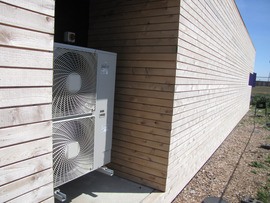 2 Pumps: A device used to move air, liquid, or gas by mechanical means
2 Pumps: A device used to move air, liquid, or gas by mechanical means
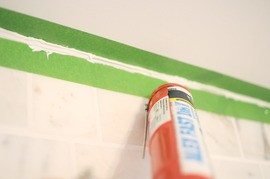 3 Caulking: A chemical sealant used to fill in and seal gaps where two materials join, for example, the tub and tile, to create a watertight and airtight seal. The term "caulking" is also used to refer to the process of applying this type of sealant
3 Caulking: A chemical sealant used to fill in and seal gaps where two materials join, for example, the tub and tile, to create a watertight and airtight seal. The term "caulking" is also used to refer to the process of applying this type of sealant
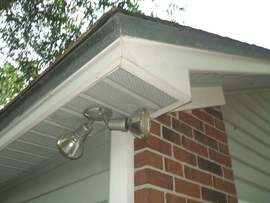 4 Soffit: Construction material, typically composed of vinyl or aluminum, used to enclose the underside of eaves and ceilings
4 Soffit: Construction material, typically composed of vinyl or aluminum, used to enclose the underside of eaves and ceilings
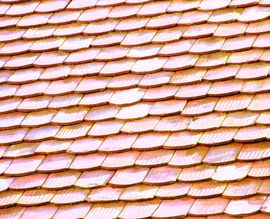 5 Shingles: A smooth, uniform, flat piece of construction material, available in a wide variety of materials and laid in a series of overlapping rows, used to cover the outside of roofs or walls to protect against weather damage and leaks.
5 Shingles: A smooth, uniform, flat piece of construction material, available in a wide variety of materials and laid in a series of overlapping rows, used to cover the outside of roofs or walls to protect against weather damage and leaks.
6 Heat pump: A device used to heat or cool the air in a home by moving hot and cold air to where it is needed. The unit pulls hot air from inside the home in the summer and directs it outdoors, leaving the inside air cool, and pulls heat from outdoors in the winter and directs it into the home, thereby warming it
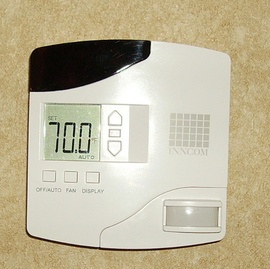 7 Thermostat: A device that senses and regulates temperature by turning heating and cooling devices on and off
7 Thermostat: A device that senses and regulates temperature by turning heating and cooling devices on and off
9 Radon: A colorless, odorless, cancer-causing, radioactive gas
10 Asbestos: A group of fire-resistant silicate minerals found in construction materials including paint, particularly in older homes. When the asbestos deteriorates, particles can become airborne and this is a serious health hazard.
11 Drain field: The part of a septic system that is used to remove pollutants and impurities from the fluid coming out of the septic tank.
 12 Lead: A naturally occurring heavy metal that is highly toxic to humans, and has been used in paint, gasoline, piping, and other applications
12 Lead: A naturally occurring heavy metal that is highly toxic to humans, and has been used in paint, gasoline, piping, and other applications
13 Levels: The process of evening out the ground's surface, making it either flat or sloped.
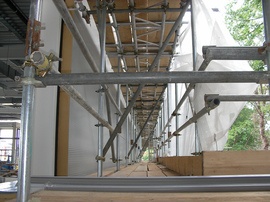 14 Stage: A temporary structure used during construction/maintenance/painting projects to raise and support workers (or one worker), required materials, and equipment
14 Stage: A temporary structure used during construction/maintenance/painting projects to raise and support workers (or one worker), required materials, and equipment
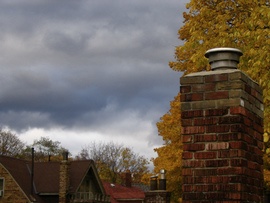 15 Flue: A duct or pipe through which exhaust gases from a fireplace, stove or boiler are released to the outdoors
15 Flue: A duct or pipe through which exhaust gases from a fireplace, stove or boiler are released to the outdoors
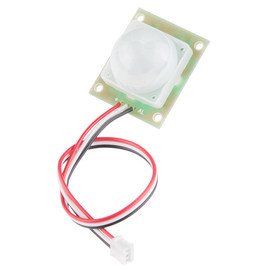 16 Detectors: Device that responds to a physical event or change in the environment by emitting an output signal
16 Detectors: Device that responds to a physical event or change in the environment by emitting an output signal
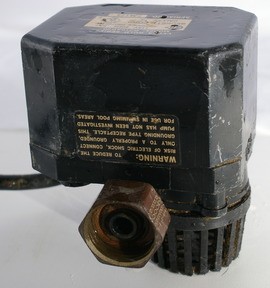 17 Sump pump: A mechanical device used to remove water from wet areas such as basements and crawlspaces in order to help prevent flooding
17 Sump pump: A mechanical device used to remove water from wet areas such as basements and crawlspaces in order to help prevent flooding
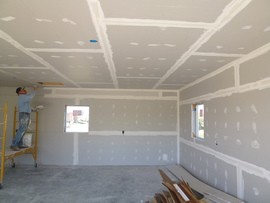 18 Drywall: Type of plasterboard, commonly used to build walls and ceilings, composed of gypsum that is layered between sheets of heavy paper
18 Drywall: Type of plasterboard, commonly used to build walls and ceilings, composed of gypsum that is layered between sheets of heavy paper
better homes and gardens sheets 700 count
Source: https://www.fixr.com/costs/home-inspection
Posted by: hollynuied1984.blogspot.com

0 Response to "better homes and gardens sheets 700 count"
Post a Comment